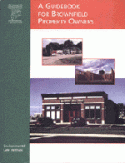
Research Reports
ELI publishes Research Reports available for free download that present the analysis and conclusions of the policy studies ELI undertakes to improve environmental law and policy. These reports contribute to education of the profession and disseminate diverse points of view and opinions to stimulate a robust and creative exchange of ideas. Those publications, which express opinions of the authors and not necessarily those of the Institute, its Board of Directors, or funding organizations, exemplify ELI’s commitment to dialogue with all sectors.
There are compelling reasons for Inter-American collaboration in developing a hemispheric framework for pollution prevention in hard rock mining. Trade and investment in this sector are expanding. Many of the natural resources potentially threatened by mining have common characteristics or are shared by countries. Mining companies are operating as multinationals. An Inter-American approach to environmental regulation helps to set a common playing field as well as avoids the complexity of having different standards in different regions.
Read More >The environmental impacts of hard rock mining can be highly adverse if the proper pollution prevention technology and regulatory framework are not in place and properly functioning. Pollution prevention as a strategic management principle offers the opportunity to avoid or minimize significant environmental impacts of hard rock mining while also identifying and promoting economy and efficiency in the design and operation.
Read More >
This report explains the process, problems, and rewards of redeveloping brown-fields. Chapter 1 answers key questions about brownfields and discusses some of the reasons that property owners should consider cleaning up and redeveloping their brownfield proper-ties. The following chapters of the guidebook explain the brownfield cleanup and redevelopment process and the issues that property owners may need to address.
Read More >
This report examines and identifies approaches to building the capacity of communities to participate in the Environmental Protection Agency's (EPA) decision-making processes. The focus of this study was on individual citizens and local non-profit groups within communities that may be interested in or affected by EPA activities. Capacity was defined as the ability of a community to participate effectively in EPA activities and decision-making.
Read More >Out Of Print
Addressing excessive environmental damage from armed conflict has always been problematic. Jay Austin and Carl Bruch, who served as principal organizers of the First International Conference on Addressing Environmental Consequences of War, draw on the meeting`s findings to sketch out an array of possible legal solutions.
Read More >